|
Thursday, Sept. 25
8:30 a.m. - 5 p.m.
Pixels08 Conference - One West
11 a.m.
Theoretical Physics Seminar (NOTE TIME) - Curia II
Speaker: Antonio Delgado, University of Notre Dame
Title: Higgs-Unparticle Interplay
THERE WILL BE NO PHYSICS AND DETECTOR SEMINAR THIS WEEK
3:30 p.m.
DIRECTOR'S COFFEE BREAK - 2nd Flr X-Over
THERE WILL BE NO ACCELERATOR PHYSICS AND TECHNOLOGY SEMINAR TODAY
4 p.m.
Atom Smashers documentary - Ramsey Auditorium
Friday, Sept. 26
8:30 a.m. - 3 p.m.
Pixels08 Conference - One West
12 p.m.
Gallery Lecture Series - Curia II
Speakers: Lori Napoleon and Ed Wesly (Artists)
Title: Optics and Artists: Intersections of Art and Science
3:30 p.m.
DIRECTOR'S COFFEE BREAK - 2nd Flr X-Over
4 p.m.
Joint Experimental-Theoretical Physics Seminar - One West
Speaker: Benjamin Grinstein, University of California, San Diego
Title: Lepton Flavor Violation
Click here for NALCAL,
a weekly calendar with links to additional information. |
|
Thursday, Sept. 25
- Tomato florentine
- *Pork BBQ sandwich
- Smart cuisine: olive & artichoke paella
- Smart cuisine: chicken marsala
- Smoked turkey melt
- Assorted Slice Pizza
- SW chicken salad w/roasted corn salsa
*Carb restricted alternative
Wilson Hall Cafe menu |
|
Wednesday, Sept. 24
Lunch
- Southwest cornish hens
- Chipotle sweet potatoes
- Orange carmel flan
Thursday, Sept. 25
Dinner
- Closed
Chez Leon menu
Call x4598 to make your reservation. |
|
|
"Atom Smashers" screening at 4 p.m. today in Ramsey Auditorium
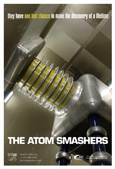 |
| Promotional poster from "Atom Smashers", a film focusing on Fermilab and CERN in the race for the Higgs. |
Fermilab employees and users can get an early look at a PBS documentary on
Fermilab's race to find the Higgs boson and other physics beyond the
Standard Model at 4 p.m. today. The Chicago-based directors of "Atom Smashers" will air
their 73-minute documentary in Ramsey Auditorium. The directors also will answer questions from the audience, such as why
they chose to spend 3 ½ years chronicling life at Fermilab and why they
think the general public will find the quest for discovery engrossing.
Read more about the film
|
Fabiola Gianotti to take helm of ATLAS collaboration
 |
| Fabiola Gianotti |
When Fabiola Gianotti first traveled to CERN as a young post-doc in the early 1990s, she was overwhelmed by the laboratory's international culture.
Starting March 1, 2009, she'll help lead that international community as
the ATLAS collaboration's new spokesperson.
"Clearly this is a role for which she has been training," said Fermilab theorist and colleague Chris Quigg. "From my perspective, the important characteristics in this position are a good physics sense and an effective manner with people. Fabiola has both. ATLAS has chosen well."
Gianotti, who has served as ATLAS physics coordinator from 1999 to 2003 and has worked with the collaboration since its inception, will take over from Peter Jenni, who will step down after 15 years.
"It is a big honor and big responsibility. Peter has given the most crucial contributions to develop and shape the collaboration," Gianotti said.
Jenni plans to get back to more hands-on physics, including helping to run the detector.
Gianotti was selected out of three candidates because of her competence and leadership qualities. "She listens to people and is an excellent physicist," Jenni said.
Gianotti's physics career stems from a love for philosophy and life's great questions.
"At some point, I figured that I needed to decide what to do with my life, and I thought that physics was a more practical way to address these questions," Gianotti said.
Gianotti received her Ph.D. in experimental physics from the University of Milano. Her thesis was on data analysis for the UA2 experiment.
Gianotti began working on liquid-argon calorimetry at the LHC in 1990 and continued that work for ATLAS when the collaboration began in 1992. Gianotti also worked on LEP2's supersymmetry search between 1996 and 2000.
She is excited for her new role, which coincides with an exciting era of physics.
"This is the first step in a very long and exciting path," she said.
-- Rhianna Wisniewski
|
Pajama Party patches available
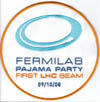 |
| Iron-on patches for the LHC first beam Pajama Party |
Fermilab's Pajama Party patches are back by popular demand. If you'd like a patch, please stop by the Office of Communication to pick one up or e-mail Barb Kronkow at kronkow@fnal.gov.
|
Big Bang or Big Bounce?: New theory on the universe's birth
From Scientific American, October 2008
Our universe may have started not with a big bang but with a big bounce-an implosion that triggered an explosion, all driven by exotic quantum-gravitational effects
Atoms are now such a commonplace idea that it is hard to remember how radical they used to seem. When scientists first hypothesized atoms centuries ago, they despaired of ever observing anything so small, and many questioned whether the concept of atoms could even be called scientific. Gradually, however, evidence for atoms accumulated and reached a tipping point with Albert Einstein's 1905 analysis of Brownian motion, the random jittering of dust grains in a fluid. Even then, it took another 20 years for physicists to develop a theory explaining atoms-namely, quantum mechanics-and another 30 for physicist Erwin Müller to make the first microscope images of them. Today entire industries are based on the characteristic properties of atomic matter.
Physicists' understanding of the composition of space and time is following a similar path, but several steps behind. Just as the behavior of materials indicates that they consist of atoms, the behavior of space and time suggests that they, too, have some fine-scale structure-either a mosaic of spacetime "atoms" or some other filigree work. Material atoms are the smallest indivisible units of chemical compounds; similarly, the putative space atoms are the smallest indivisible units of distance. They are generally thought to be about 10-35 meter in size, far too tiny to be seen by today's most powerful instruments, which probe distances as short as 10-18 meter. Consequently, many scientists question whether the concept of atomic spacetime can even be called scientific. Undeterred, other researchers are coming up with possible ways to detect such atoms indirectly.
The most promising involve observations of the cosmos. If we imagine rewinding the expansion of the universe back in time, the galaxies we see all seem to converge on a single infinitesimal point: the big bang singularity. At this point, our current theory of gravity-Einstein's general theory of relativity-predicts that the universe had an infinite density and temperature. This moment is sometimes sold as the beginning of the universe, the birth of matter, space and time. Such an interpretation, however, goes too far, because the infinite values indicate that general relativity itself breaks down. To explain what really happened at the big bang, physicists must transcend relativity. We must develop a theory of quantum gravity, which would capture the fine structure of spacetime to which relativity is blind.
The details of that structure came into play under the dense conditions of the primordial universe, and traces of it may survive in the present-day arrangement of matter and radiation. In short, if spacetime atoms exist, it will not take centuries to find the evidence, as it did for material atoms. With some luck, we may know within the coming decade.
Read more
|
|
|
The particle family tree
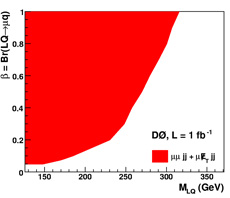
This figure illustrates the second-generation leptoquark parameters that DZero's search results can exclude. The search excludes masses up to 316 GeV for leptoquarks that exclusively decay to a quark and charged lepton.
By studying historical records of past generations, genealogists piece together the lineage of families. In an effort to understand the history of the elementary particle generations, physicists at the Tevatron's DZero experiment are finding they may have more in common with genealogists then they thought.
The historical record of our universe surrounds us. Through careful studies of our world, particle physicists have identified what they believe are the most basic building blocks of matter. These 12 particles populate two families (quarks and leptons) that are grouped into three generations, each heavier than the last. Current theories do not explain why there are three generations, nor why the two families share similar patterns. Various theories speculate that an unobserved symmetry of the universe might explain the number and equality of quark and lepton generations. Such a symmetry would give rise to a new particle that links the two families, just like an ancient relative connecting the genealogies. These new particles, called leptoquarks would provide a means for quarks and leptons to interact with each other, but not across generations unless they are very heavy.
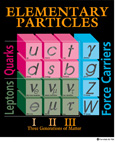 |
| Twelve particles that make up the building blocks of matter are grouped into three generations, as shown above. |
Finding evidence for leptoquarks would bring a new understanding to the connections between the families and generations of matter particles. These proposed particles, however, are difficult to find. Because of their large mass, the production of leptoquarks would have ceased when the universe began to cool as it aged and expanded. By studying the Tevatron's proton/anti-proton collisions, which recreate conditions just after the Big Bang, scientists can turn back the universe's clock to the time of possible leptoquark production.
Physicists from the DZero experiment designed an analysis to search for leptoquarks that interact with the second generation of matter particles (muon, muon neutrino, charm & strange quarks). In one inverse femtobarn of data, they searched for two leptoquarks that were created at the same time, and having final states of two muons plus two quarks or a muon, a neutrino and two quarks. They did not find evidence for new physics, so their work sets the Tevatron's tightest mass limits for second-generation leptoquarks. Though this leaves some mystery surrounding the families of matter particles, the DZero scientists will continue their genealogical studies. With more data being delivered daily by the Tevatron, they may still bring these families together.
Read more
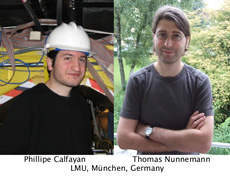
A group of DZero collaborators made primary contributions to this analysis. Not pictured: Yuriy Merekov of the Joint Institute of Nuclear Research (JINR), Russia.
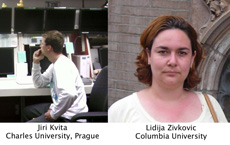
DZero's Jet/MET identification team provides the algorithms that find the signatures of quarks and neutrinos in the DZero data. Their work is essential for a broad range of DZero physics, such as the analysis presented here.
|
|
Have a safe day!
Classroom presenter kickoff party Monday
Anyone interested in becoming a classroom presenter can join the Education Office for a kickoff party from 11:30 a.m. - 1 p.m. on Monday, Sept. 29, at Kuhn Barn. Come and meet others who have presented and view the presentation material and new van. RSVP to Nancy Lanning at lanning@fnal.gov by 5 p.m. today. Visit the presentation
Web site for more information.
Fermilab Art Gallery Exhibit opens Friday
Join your colleagues for an Arts Series lecture in Curia II from 12-1 p.m. on Friday to mark the opening of the Gallery's newest exhibit, "Intersections: the Art and Science of Light
experiments in Holography, Photography and Mixed Media." The exhibit features works by Lori Napoleon, Ed Wesly and Todd Johnson. An artist reception will take place from 5-7 p.m. in the Art Gallery. Check the Art Gallery Web site or e-mail Georgia Schwender for more information.
Kids can become prairie rangers
Your child can become a junior prairie ranger. Children in fourth and fifth grades can become prairie stewards by joining the Fermilab Junior Prairie Rangers. Rangers will learn about the biodiversity of the prairie and how they can help it thrive. Choose one of the Saturday meetings: Sept. 27 or Oct. 18, from 9 a.m. - 2 p.m. Rangers will wear a new ranger cap while harvesting seeds on one of the seed harvest days, Oct. 4 or Nov. 1, from 10 a.m. - 1 p.m. Throughout the year, rangers will participate in other prairie activities. More information is available on the calendar for kids.
International Folk Dancing Thursday
International Folk Dancing will take place in the Kuhn Village Barn on Thursday, Sept. 11. Dancing begins at 7:30 p.m. with teaching and children's dances earlier in the evening and request dancing later. For more information, call (630) 584-0825 or (630) 840-8194 or e-mail folkdance@fnal.gov.
Additional Activities
|
|